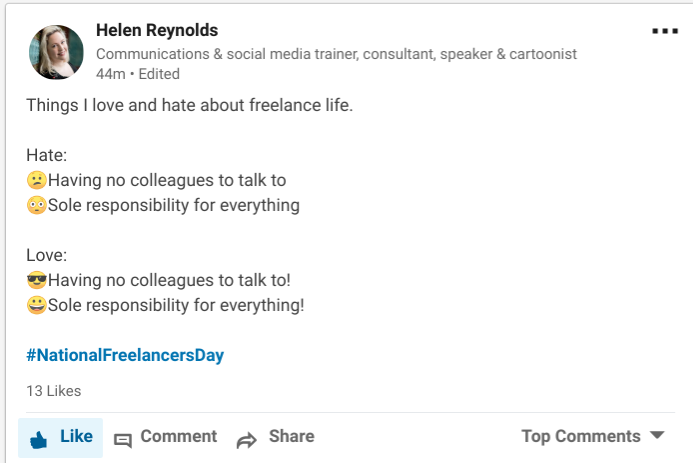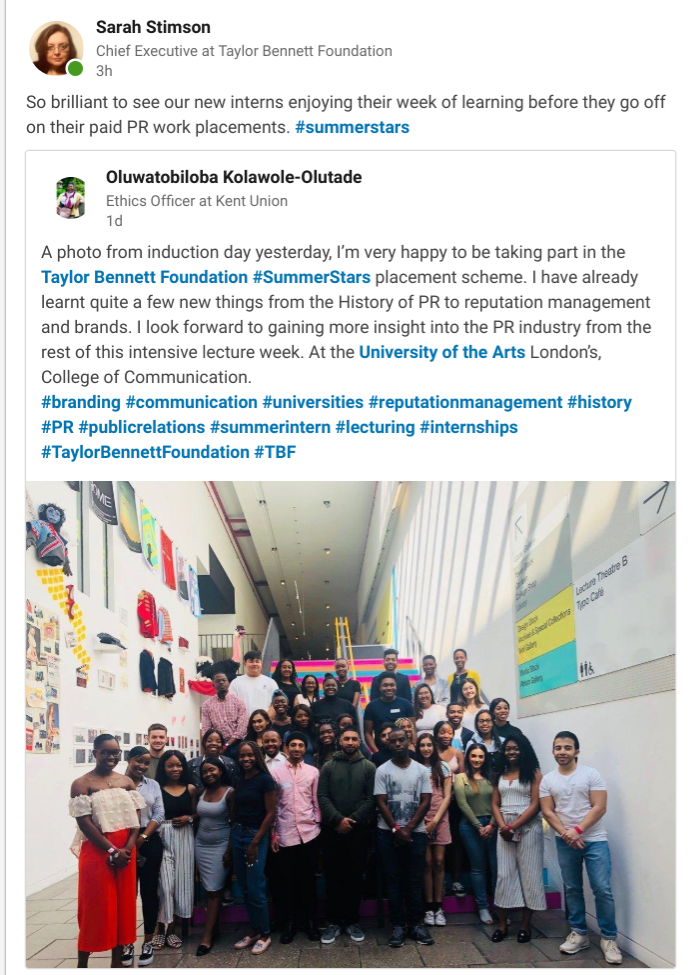This week in PR (29 June)

About the author
Richard Bailey Hon FCIPR is editor of PR Academy's PR Place Insights. He teaches and assesses undergraduate, postgraduate and professional students.

News in brief

- CIPR and PRCA are both lobbying against the threat to the open internet posed by the EU’s Copyright Directive. The media is framing the proposal as a ‘war on memes.’
- 2017 CIPR president Jason MacKenzie has been appointed managing director of Curzon PR working alongside founder and CEO Farzana Baduel.
- The referee in England’s group match against Panama in the football World Cup works in public relations. Ghead Grisha ‘is a public relations professional who works for an oil company in his native Egypt’ (according to Jonathan Northcroft writing in the Sunday Times).
- Advertising: Here’s an historical account of the rise of fall of ‘motivational research’ in advertising, from author Paul Feldwick.
- Management: John Elkington invented the phrase ‘the triple bottom line’ in 1994. He explains why he’s recalling it for some fine-tuning.
- Leadership: Tony Schwartz argues that Leaders Focus Too Much on Changing Policies, and Not Enough on Changing Minds
Calendar
Our calendar of events now appears on a separate page
Insights and opinions: Pick of the posts
These are the editor’s pick of posts about public relations this week (UK focused, but with a global outlook). Recommendations are welcome to editor@prplace.com or @pr_place
Business / profession
- Si Francis: Communicating causes: the new bible for campaigners (29 June)
‘The book, launched at a PRCA Charity and Not for Profit event last night, is a compilation of essays covering a range of facets of campaigning and will become the go to bible for anyone wanting the history of campaigns, the ethical considerations of campaigning and practical inspiration on how to campaign effectively.’ - Ruth MacLeod: Scotland’s PR industry: ‘As distinct as Irn-Bru’ (28 June)
‘Nurturing our PR talent in Scotland was one of the motivations for the CIPR Scotland launching its Future Leaders Programme, which aims to support and inspire young people working in the communications industry here.’ - Paul Sutton with John Brown: No more bullshit: the value of brutal honesty [podcast] (27 June)
‘It’s easy to help brands that are already honest. It’s a bit harder and more interesting to help organisations who want to be more honest and more transparent.’ - Helen Sewell: Accelerate buy-in: use a helicopter view (26 June)
‘In this data-driven age, people tend to be so swamped by masses of information that they lose sight of the wider implications. Unfortunately, if you fail to see the wood for the trees, you can’t describe the context adequately, and this makes it tough to gain support for your views.’ - Darren Caveney: 8 lessons from the Harlem Globetrotters of communications (24 June)
‘Ali Marsland, director of the Effective English Company, reminded us that the average reading age in the UK is 8. For Sun readers it’s 7. It’s important we remember this when writing for our audiences. And watch that those sentences don’t become too long – 15-20 words per sentence is best for readability.’
Artificial Intelligence
- Pretty Green: In the real world we may fear AI; but in marketing it inspires (28 June)
‘Whilst the conversations around the ultimate impact of AI and robotics are debated more widely, for now, and in our industry, technology offers us new opportunities and encourages marketing to up its game. This, perhaps because deep down we are all a bunch of geeks, makes for exciting times.’ - David Phillips: #AIinPR – A response to Jean Valin’s paper (26 June)
‘In this review of the #AIinPR context, I have challenged some assumptions we have examined so far and proposed a way in which the PR sector can put its practitioners in the forefront of relationship development.’ - Stephen Waddington: An AI in PR primer (26 June)
‘Artificial intelligence (AI), has become a catch all term to describe technology that simplifies a task for a human being. It’s unhelpful and is contributing to hype and uncertainty around the topic.’ - Stephen Waddington: Tackling the impact of tech and AI on PR (26 June)
‘The march of technology in PR is undeniable. Here’s a plan for embracing innovation in your organisation.’
Careers and skills
- Amanda Coleman: A human being (28 June)
‘At its heart [PR] has to be about people and their lives, their issues, their requirements.’ - Nigel Sarbutts: STOP IT! Five Things PR Freelancers Need to Stop Doing Today (28 June)
‘You need to protect your down time and your schedule. Late or rush fees are the norm in every type of business, because there’s a value in having that facility on tap. If you don’t have a schedule of rush fees then you are a 24/7 business. Don’t be.’ - Miranda Rock: A Slight Return – One Year On (28 June)
‘As an employee I found myself sat in long meetings where the content was of little relevance to my team. As a consultant, rather than sitting for three hours in a meeting missing my desk, the outcomes and tasks were summed up in an email for me to action.’ - Daniel Gerrella: All I need is a smartphone (27 June)
‘Building rapport and emotional connections is much easier face-to-face. So much of what we communicate is unspoken, with body language and facial expressions key to our understanding of meaning. If I worked remotely all the time, I would lose the benefits of this interaction, and make my role more challenging.’ - Sarah Pinch: Investing in yourself, others and the future. Part one (26 June)
‘Some senior colleagues, clients and friends say that Continuous Professional Development is not for them. For me, I love learning. Any opportunity to try something new (unless it involves snakes or sprouts) the answer will always be yes from me.’ - Ben O’Callaghan: Know the limits of your own resilience (22 June)
‘Nobody is going to stop piling work on you until you say no and nobody is going to offer you support unless you ask for it. Build yourself a support network, learn when to push back and most importantly, put yourself first.’
Campaigns, creativity and Cannes
- Paul Holmes: Cannes: Ranking the 2018 PR Gold Lions Winners (27 June)
‘There are virtually no meaningful metrics. Almost all of them provide information on media impressions (a billion seems to be the baseline) and, occasionally, on social media engagement. There is almost literally no effort to demonstrate any business impact, whether its sales, net promoter score, or even brand perceptions.’ - Alan VanderMolen: When PR Isn’t PR (and Does It Matter?) (26 June)
‘I’m kind of over ad agencies winning PR Lions. Two years ago, I was upset about it. Last year I was disappointed. This year, I’m in a ‘who cares?’ space.’ - Francis Ingham: Postcard from Cannes: There were far fewer PR people here than last year (22 June)
‘But here’s the truth. We have a problem with Cannes. And that means Cannes has a problem too. There were far fewer PR people here than last year. Far fewer than when I first came here, five years ago.’ - Stuart Bruce: PR firms flop again in Cannes Lions PR Grand Prix – so what? (22 June)
‘The best PR is PR that works. It helps sell products. It improves employee retention or recruitment. It supports the share price. It defends against damaging legislation. It protects reputations in a crisis. It’s about an organisation’s licence to operate.’
Gender and diversity

- Maja Pawinska Sims: The Gender and Diversity Agenda Dominates Cannes Once Again, But To What End? (26 June)
‘The gender pay gap in the PR industry, frustratingly, is actually widening, and the sketchy data available suggests the number of ethnically diverse people in the industry remains embarrassingly low.’
Internal communication
- Gloria Lombardi with James Murphy: Develop your culture to thrive within the wider business ecosystem (29 June)
‘The design and support of a healthy organisational environment, within the larger ecosystem, starts with values. Communicating concise, clear values is important, but values must be lived, not only printed on posters or the read-once employee handbook.’ - Stephen Welch: What type of animal is your employee engagement programme? (28 June)
‘Unicorn-like promises are made all the time by people who think that a series of on-the-spot internal comms, a flash-in-the-pan employee engagement scheme, or a shiny new intranet can produce rainbow-emitting results.’ - Helen Deverell: What’s involved in becoming #CIPRQualified? (24 June)
‘My cohort was the first one to do the new assignment – a management proposal rather than a piece of research. The purpose of this was to make it more relevant and useful to employers – it’s something you can actually take back to the workplace and implement.’
Media and digital
- Dan Slee: HARD DAYS: Two things The Beatles can teach you about tips for making effective short form video (28 June)
‘The Beatles came from an era when singles were king. So, they made records to be singles. They needed a hook straight away. They needed you to listen.’ - Maria Tabish Chawla: The Importance of Empathy in Media Relations (26 June)
‘When ‘imagining the life’ of journalists you wish to contact and develop relations with, there are a few questions that need to asked and understood.’ - Scott Guthrie: Luxury Hotels and influencers: best ways to work together (22 June)
‘The tent-pole campaign mentality of influencer advertising is giving way to long-run relationships founded on co-created content.’ - Sarah Evans: We’ve been thinking about linking (22 June)
‘They are a strong signal for now, but we know that only thinking about links is not a very future-proof strategy.’ - Rhian Robinson: Instagram launches IGTV (22 June)
‘The new app allows users to create their own channel, similar to YouTube. Anyone with an Instagram account can create their IGTV channel simply by uploading their first video.’